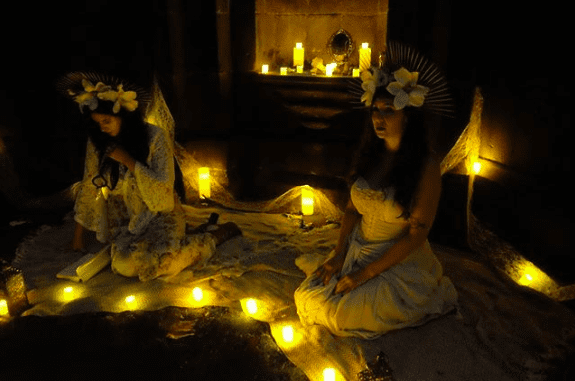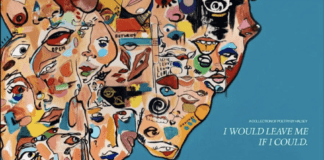
When we encounter poetry in the flesh, it’s so often in an uncomfortable and unforgiving setting — a space so antithetical to poetry itself.
Poetry is throw blankets and candles, late nights and wine. Poetry is human and fleshy and raw and real. Poetry is trauma and luminosity.
There’s just no way a beige-colored classroom full of plastic chairs can evoke that. I don’t buy it; you can never convince me. Readings often take place in halogen-lit classrooms or brightly-lit bookstores, where the intensity of tubular lights bear down on the reader, oppressing any exchange of emotion. And making it hard to relax into the medicine of poetry.
I’ve given hundreds of poetry readings in my day, and I can tell you for a fact that it’s much harder to connect to the organic nature of emotion when you’re in an inorganic, sanitized environment best suited to keep people awake and alert.
Poetry isn’t awake and alert, though. It’s liminal and languid; it flows through you as water does. It melts you. Makes you feel high and woozy and soft. It gets you malleable and vulnerable.
So, maybe you’ll find a poetry reading at a bar if you’re lucky. This is marginally better, and yet the poet and the poetry itself competes with the clanking of glasses and the pitter-patter of waitstaff. People are paying bills and ordering food and splitting their attention. Again, marginally better, but it’s better to have this than no poetry.
The thing is, I’m not a disconnected snob. It’s important that we see poetry readings in bars and classrooms and libraries. This shouldn’t ever stop because poetry readings — which are often free-of-charge — offer people the ability to engage with living, breathing art. To talk to poets. To experience literature that is often rooted in the community, politics, body, and health. Poetry, of course, has never been afraid to resist, reclaim, and tackle the hard subjects.
The very lifeblood of humanity depends on these spaces and these poetry readings — and that’s not an exaggeration. A society without art, and without access to art, is profoundly isolating, scary, and empty.
That said, immersive poetry readings take the poetry listening perspective to a whole new level, one I’ve been lucky enough to experience (and produce) over the years. Having myself a personal aversion to the bright white lights at most poetry events, as well as the general discomfort involved for all (uncomfortable chairs, inability to move or talk, limited breaks, no invitation to truly unfold and breath), I gravitate toward the immersive.
An immersive experience is one that allows the viewer or listener to have a transformative experience — one that is connected to the reader. Rather than simply listening, shaking your head and clapping when expected, an immersive event transports the listener by way of sound, space, lighting and a goal.
These readings are often intimate, where energy is exchanged between the listeners and the performer. Together, in a sense, they both achieve something. Perhaps the audience is asked to take part in some way — maybe they are asked to pray or write something down or interrupt the poet. Maybe they are asked to donate something to an altar space. Maybe everyone gets to sit closer, to ask the poet questions in a conversational atmosphere. Maybe the performance is less about the poet’s work and more about witnessing transformation through ritualistic reading.
What is gained may be different for both parties, but there’s a shared experience occurring — and that’s a powerful thing, especially when it comes to poetry, which is often read and written in an attempt to connect and be heard or seen (with others or to the self or to spirit). Maybe poetry is made to release or conjure something.
For many years, I performed for a theatrical poetry show hosted by The Poetry Society of New York. Between musical and dance performances, poets performed to quiet, candle-lit rooms. The focus was on the poet as story-teller. Someone whose voice wasn’t separate, at a podium. They were not untouchable.
The listeners sat all around, some laid down, and others were free to walk up to the poet and listen closely. It felt like a poetic slumber party — all dreamy and intimate. And because the setting was always so beautiful — plush sofas and fireplaces and velvet backdrops — people could more easily fall into the poem’s language.
Once the poet was done reading, people could ask for private, one-on-one readings with them — or with another poet. In this setting, the listener could ask questions, interrupt the poet with questions, and even ask for a re-read. It was permitted that the listener and reader come together through poetry. No awkward clapping or rushed readings.
There are a few experiences like this out there — and they each differ, depending on who produces them.
In short, the environment in which poetry is being expressed is a conduit; it can bring you, by hand, into the world of the poet. It’s a lubrication of sorts.
A few years ago, I saw an immersive theatre performance, The Grand Paradise, produced by Brooklyn’s The Third Rail. Taking place in the 1970s in a tropical resort environment, the audience walks around the sets, interacting with the performers. One-on-one encounters had me sitting in tropical “bars” and other rooms (and once, in a coffin) with the performers, who read poetry and recited monologues to the viewers. Sometimes just one or two people.
In one room filled of sand and shells, the performer recited a dreamy, poem-like monologue to me as I sat, with bated breath, looking into her eyes. It was me and her, alone. She held my hand. The intimacy was overwhelming; it mirrors what a poem physically and psychically does to you — that gasp, that sudden feeling of being seen, or perhaps being a voyeur — when you read it alone in bed at night.
As humans, we long for human connection. We long for that intimacy, touch, closeness. And in these environments, we are asked (obviously with consent) to let our guard down, to really get out of our comfort zones, and let humanity flood over us.
A while ago, I saw Janaky Stucky reciting (although he wasn’t performing; he was simply being, it seemed) from his book-length poem-spell, Ascend Ascend. A poet whose work is rooted in the occult, Stucky wrote the entire book in and out of trance states while living in a 100-year-old church. The book is an exploration of the self and the divine, and with each page, the reader goes deeper and deeper — or higher and higher — into some cthonic, ecstatic place.
Of course, Stucky created an immersive reading around his book. Standing in the center of a great church, we witnessed a transformative ritual take place. Surrounded by marigolds and a chalk-drawn sacred circle, Stucky recited his work into the candle-lit crowd of listeners.
His words, backed by original compositions by Mark Korven (of The VVitch), echoed into the room filled of incense and walls of bleeding sound. Stucky anointed himself and performed a ritual, inviting us to watch and feel the transformation. We sat on pews, all of us, in prayer to poetry, to the self, to the divinity of whatever was happening before us.
This sort of ‘reading’ asks the audience to be more than listeners. They are invited on a journey. They can change. They aren’t static.
In that space, I witnessed again the nearly-holy power of poetry. I was reminded again of the pleasures of witnessing poetry in an intimate setting, in an environment fit for and respecting of the power of poetry, in a space where the audience is allowed to feel, weep, and connect.
It beats the polite — if somewhat awkward — clapping at too-long poetry readings where people are assaulted by bright lights and uncomfortable chairs. Where poets try to tap into their emotional truth at a podium or on a stage, separate — literally and metaphorically — from the very people they’re trying to connect with or touch.
Poetry is magic. Poetry casts spells — either literally, by being written as words of conjure — or by descending upon the audience in a feverish haze of potent vulnerability. It lifts the veil from the ordinary and submerges us in something otherworldly and yet, entirely human. Poetry permits us to feel something. So why should it be forced into environments that can’t hold space for it?
Why should we be vulnerable in spaces that don’t hear or see us? Why is this any different?
When I produced immersive poetry events as part of a series called Diorama, I had the opportunity of a lifetime — to create a poetic showing, Missa Brevis, to be held at historic and verdant Green-Wood Cemetery.
The show was produced by Atlas Obscura, and so thousands of people roved through the graveyard, stumbling upon dozens of acts. When people came up the little hill toward our space — a Mausoleum lit by dozens of candles.
My co-performer (see Instagram below) and I recited our dialogic poetry performance — a sort of ritual honoring death, and of letting go — to the crowds that formed. After, in silence, we motioned for the listeners to write something down and place it into a jar. They watched ritual take place and then were able to take part themselves.
Under all those trees, under that starry sky, we were able to truly connect with thousands of people.
Poetry doesn’t have to be academic, watered-down, awkwardly performed, or disconnected. It can be warm and intimate and open. It can be read without poetry voice, in a whisper, in a way that feels like a friend telling you a secret. It can be made into ritual.
An immersive event can be produced, sure, but it can also be done in your living room with friends. Perhaps you are already creating sacred poetic spaces without realizing it. How nourishing and how transformative does it feel?
Poetry, when treated with love and respect, can break your expectations. It can be confessional, theatrical, alive, ripe, fleeting, and wild. If you’re able to find an immersive event — or simply throw one by creating a beautiful space of your own (in your backyard, bedroom, or at a local event venue) — you’ll find that poetry can fold you into its arms.
















